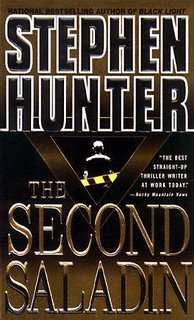Over the course of my twelve-year reading career, I've come across the defining principle of many novels -- good triumphs over evil. In romantic novels, the rebellious guy wins the heart of the fair maiden, in crime thrillers the criminal is found and duly punished, and in spy thrillers the moles get a bullet in the head. Of course, this is hardly realistic -- bad stuff happens and it seems the bad triumphs over evil in many cases.
You can imagine from my rants that I prefer people who write as realistically as possible. I'll be introducing Stephen Hunter, someone I've come to admire (even though I've read just two of his books). They always have a bitter-sweet ending -- if you prefer 'and they happily lived ever after' books, then this guy isn't for you.
The Second Saladin Paul Chardy, a CIA agent trained freedom fighters among the Kurds in Iraq, befriending their leader Ulu Beg as he helps in the fight for the Kurds to gain their freedom. Someone in the CIA betrays Chardy, and he falls into the hands of the Soviets. Somehow, someway, Ulu Beg believes Chardy to have betrayed their cause -- especially when his son gets killed.
Paul Chardy, a CIA agent trained freedom fighters among the Kurds in Iraq, befriending their leader Ulu Beg as he helps in the fight for the Kurds to gain their freedom. Someone in the CIA betrays Chardy, and he falls into the hands of the Soviets. Somehow, someway, Ulu Beg believes Chardy to have betrayed their cause -- especially when his son gets killed.
Ten years later, Chardy has left the service, and the CIA recieves an alert -- Ulu Beg has crossed into the United States through Mexico. His mission is to assassinate a leading American political figure.
Against his wishes, Chardy finds himself pulled in to track his friend. As his trainer, he is the only one who can read Beg. The CIA wants him killed -- Chardy wants to save him. Between them is a woman who has known, fought with and loved both of them -- Chardy as a lover, Beg as a friend. What ensues is something you wouldn't find in your wildest dreams.
The Spanish Gambit (also called Tapestry of Spies) Robert Florry was once a police officer in India during the British occupation. While carrying out his duties, he caused an innocent man to be hanged. His past comes back to haunt him when the British Secret Service use the leverage to recruit him to track down Julian Raines, a British poet and radical who was once his friend.
Robert Florry was once a police officer in India during the British occupation. While carrying out his duties, he caused an innocent man to be hanged. His past comes back to haunt him when the British Secret Service use the leverage to recruit him to track down Julian Raines, a British poet and radical who was once his friend.
With suspected ties of working for the KGB [apparently, there was some speculation he was recruited by the Bolsheviks during his student days at Eton where he and Florry studied], Raines is one of the last people Florry would investigate. Even though they're no longer friends, Florry still has his reservations about Raines being a KGB spy.
You'll need to be a bit familiar with the Spanish Civil War and the opinions of the British political left. Again, you'll be left with a sour ending.
Let me know if you come across any Stephen Hunter books -- I've read just these two.
skip to main |
skip to sidebar


0 comments:
Post a Comment